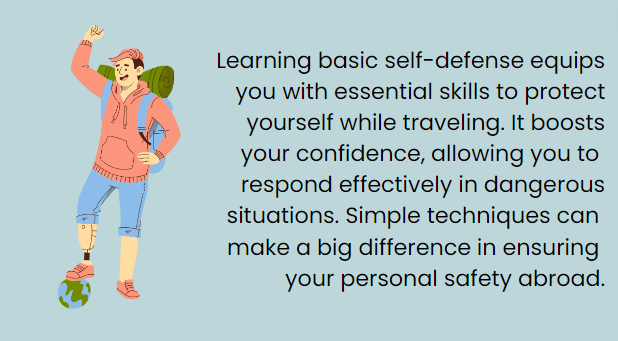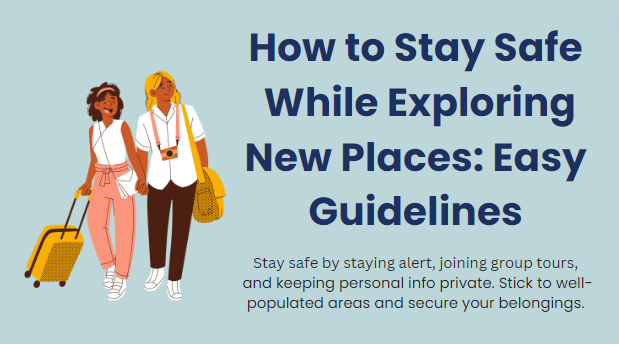Exploring new places can be an exhilarating experience, but it’s crucial to prioritize safety while embarking on your adventures. Whether you’re traveling to a bustling city or venturing into the wilderness, following these easy guidelines will help ensure a safe and enjoyable journey.
1. Research Your Destination
Before setting off on your adventure, take the time to research your destination thoroughly.
Key points to research:
- Local customs and cultural norms
- Common scams or safety concerns in the area
- Travel advisories and alerts for your destination
- Local laws and regulations
Understanding these aspects will help you navigate your new environment more safely and respectfully.
| Research Focus | Why It’s Important |
|---|---|
| Local customs | Avoid cultural faux pas by understanding traditions and norms in the area. Helps foster respect and smooth interactions with locals. |
| Safety concerns | Prepare for potential risks, such as crime rates, health precautions, and natural hazards. Knowing safety measures ensures a secure trip. |
See also>> How to Save Money When Traveling on a Tight Budget
2. Plan Your Itinerary
Having a well-planned itinerary can significantly contribute to your safety. It provides structure to your trip and helps you avoid potentially risky situations.
Essential itinerary planning steps:
- Map out your daily activities and routes
- Identify safe areas to visit and those to avoid
- Share your itinerary with a trusted friend or family member
- Be flexible and allow for changes if needed
Remember, while planning is important, it’s also crucial to remain flexible. Unexpected circumstances may arise, and being able to adapt your plans can be a key safety measure.
3. Secure Your Accommodations
Your lodging is your home base while traveling, and ensuring its safety is paramount.
Tips for securing safe accommodations:
- Read reviews from previous guests
- Opt for reputable hotels or vacation rentals
- Ensure your room has proper locks and security features
- Familiarize yourself with emergency exits and procedures
Take the time to inspect your room upon arrival. If anything seems amiss, don’t hesitate to request a change or seek alternative accommodations.
4. Stay Connected
In today’s digital age, staying connected can be a crucial safety measure.
Ways to maintain communication:
- Purchase a local SIM card or international data plan
- Save important contact numbers, including local emergency services
- Use a reliable navigation app to avoid getting lost
- Consider using a personal safety app that allows location sharing
Being able to quickly contact help or navigate unfamiliar areas can make a significant difference in emergency situations.

5. Blend In and Stay Alert
One of the best ways to stay safe is to avoid drawing unnecessary attention to yourself.
Tips for blending in:
- Dress modestly and in accordance with local customs
- Keep valuable items out of sight
- Stay aware of your surroundings at all times
- Trust your instincts if a situation feels unsafe
Remember, looking like a tourist can make you a target for scams or theft. Try to observe and mimic local behavior and dress codes.
| Safety Tip | Why It Matters |
|---|---|
| Dress modestly | Avoid unwanted attention and respect local cultural norms. |
| Stay alert | Spot potential dangers early and react quickly if needed. |
6. Use Safe Transportation
How you get around in a new place can significantly impact your safety.
Guidelines for safe transportation:
- Use official taxis or ride-sharing services
- Research public transportation options and their safety records
- If renting a car, ensure it’s from a reputable company and in good condition
- Avoid traveling alone late at night, especially in unfamiliar areas
When in doubt, opt for transportation methods recommended by your hotel or trusted local sources.
See also>> How to Make Time for Hobbies in a Hectic Schedule
7. Protect Your Health
Staying healthy is a crucial part of travel safety. Illness can make you vulnerable and disrupt your travel plans.
Health safety measures:
- Get necessary vaccinations before your trip
- Pack a basic first-aid kit
- Carry any prescription medications you need
- Be cautious with food and water in areas with lower sanitation standards
Research any specific health risks associated with your destination and take appropriate precautions.
8. Safeguard Your Belongings
Protecting your personal items and important documents is essential for a smooth trip.
Tips for safeguarding belongings:
- Use hotel safes or lockboxes for valuables
- Keep copies of important documents separate from the originals
- Use RFID-blocking wallets to protect against electronic pickpocketing
- Consider using a money belt or hidden pouch for cash and cards
Remember, it’s often safer to leave valuable items at home if they’re not essential for your trip.
9. Learn Basic Self-Defense
While hopefully never needed, knowing some basic self-defense can boost your confidence and preparedness.
Self-defense preparation:
- Take a self-defense class before your trip
- Learn how to project confidence through body language
- Familiarize yourself with common pressure points
- Practice situational awareness exercises
The goal is not to engage in physical confrontations, but to have the skills to extract yourself from dangerous situations if necessary.

10. Engage with Locals Safely
Interacting with locals can greatly enhance your travel experience, but it’s important to do so cautiously.
Guidelines for safe local engagement:
- Seek recommendations from hotel staff or trusted sources
- Join organized tours or group activities
- Be friendly but maintain appropriate boundaries
- Avoid sharing too much personal information with strangers
Building connections with locals can provide valuable insights and experiences, but always prioritize your safety.
| Engagement Tip | Safety Benefit |
|---|---|
| Join group tours | Safety in numbers, reducing the risk of being targeted. |
| Limit personal info | Protect your privacy and avoid identity theft or scams. |
See also>> How to Handle Sibling Rivalry Without Losing Your Mind
FAQs
Q: How can I research the safety of my destination?
A: Use reputable travel websites, consult government travel advisories, and read recent traveler reviews.
Q: What should I do if I feel unsafe in a situation?
A: Trust your instincts, remove yourself from the situation if possible, and seek help from local authorities or your accommodation staff.
Q: How can I protect my valuables while traveling?
A: Use hotel safes, carry minimal cash, and consider using a money belt or hidden pouch for important items.
Q: Is it safe to use public Wi-Fi while traveling?
A: Public Wi-Fi can be risky. Use a VPN or stick to secure, password-protected networks for sensitive activities.
Q: What should I do in case of a medical emergency abroad?
A: Contact local emergency services, inform your travel insurance provider, and get in touch with your country’s embassy or consulate if needed.
Conclusion
Staying safe while exploring new places doesn’t have to be daunting. By following these easy guidelines, you can minimize risks and focus on enjoying your adventures. Remember, preparation is key, and staying alert will help ensure a memorable and secure travel experience.
